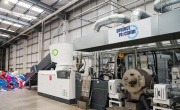Waste director given suspended jail sentence after worker crushed to death by carpet
The director of a North-West carpet reprocessor has been given a suspended jail sentence after a worker was crushed to death by a falling bale of carpet last year.
Kevin Wright, 27, was processing waste carpet Widnes-based Fresco Environmental Ltd on 1 March 2016, ready for it to be re-baled when one of the bales fell from a stack and crushed him. Wright later died from injuries sustained in the incident.
An inquest held at Warrington Coroner’s Court ruled in May that the death was accidental, but that ‘systems of storage’ at the company’s depot had contributed to Wright’s death.
A investigation by the Health and Safety Executive (HSE) has since determined that Fresco Environmental had failed to ensure that proper controls were in place to reduce the risk of falling bales.
It found that there were no exclusion zones around stacks of bales and that the bales were both poorly stacked and put in places close to vibrating machinery, raising the risks of displacement.
Appearing at Liverpool Crown Court last week, the company pleaded guilty to breaching the Health and Safety at Work Act, and was fined £70,000 and ordered to pay £3,500 in costs.
In addition, the company’s Managing Director, Lee Heaps, was sentenced to six months in prison, suspended for a year, after pleading guilty to failing to ensure that a safe system of work was in place for reprocessing carpet, which the HSE says ‘exposed his employees to avoidable risks’.
As well as the suspended sentence, Heaps was given 100 hours of unpaid community work and was ordered to pay £400 towards costs.
HSE inspector Helen Jones said after the hearing: “This tragic incident could easily have been prevented had Fresco Environmental acted to identify and manage the risks involved. As managing director involved in the day-to-day running of the company, Lee Heaps had a responsibility to ensure that his company provided a safe working environment for its employees. In failing to do so he exposed employees, including Mr Wright, to significant risk.”
HSE working on plan to improve waste safety
Wright’s death was one of six deaths in the waste sector in 2015/16, a figure that rose to 14 in 2016/17.
These figures, reported by the HSE, only take into account fatal injuries that take place in the course of waste management processes, so do not include those killed in fatal accidents with collection vehicles. In the five years leading up to March 2016 there were also 12 fatalities to members of the public as a result of work activity in the sector with most deaths to both sector workers and members of the public being caused by moving vehicles or machinery.
Britain’s national regulator for workplace health and safety highlighted in its annual report that the annual average fatal injury rate in the waste sector over the last five years is around '15 times as high' as the all-industry rate. This makes it the second most dangerous industry, ahead of construction, whose rate is four times as high as the all industry rate, but less than the agricultural industry, whose rate is around 18 times as high.
Last month, the HSE released a sector plan for increasing safety in the waste and recycling industry, identifying the reduction of fatal injuries from moving vehicles and musculoskeltal disorders among employees as priorities. The HSE’s plan will take two approaches to minimising risk: engaging others to improve workplace health and safety; and ensuring effective management and control of risk.
The Waste Industry Safety and Health (WISH) Forum provides guidance on best practice for processes throughout the sector, and the HSE also has information on how to ensure safety, including with bale handling, on its website.






